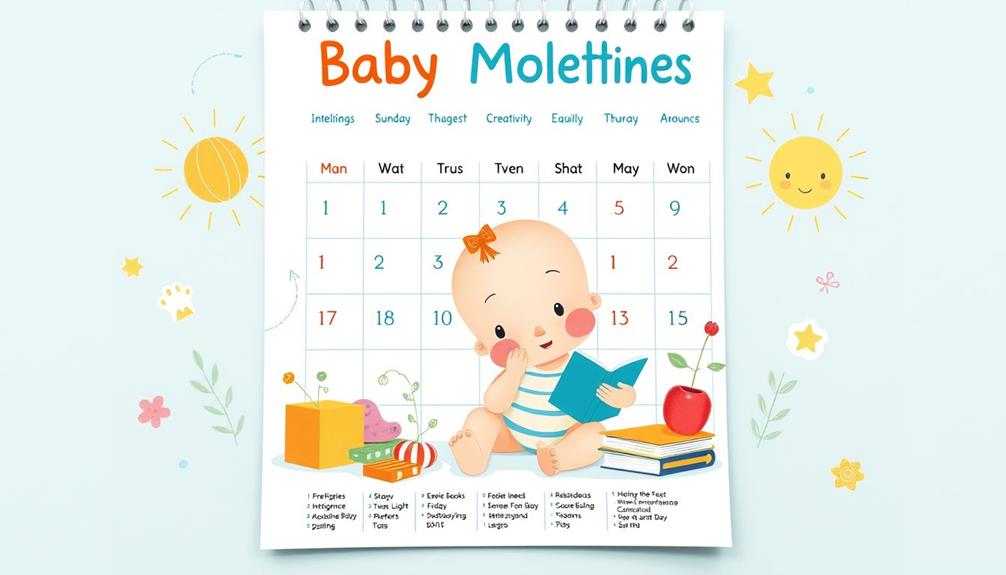Balancing proactive and reactive strategies in parenting is essential for your child's emotional and behavioral development. Proactive parenting sets clear boundaries and establishes expectations, which helps your child understand appropriate behavior and reduces anxiety. On the other hand, reactive parenting can lead to impulsive reactions that harm relationships and create confusion. By integrating both approaches, you can adapt to your child's needs while promoting their long-term growth. Emphasizing open communication and regular emotional check-ins enhances understanding and connection. You'll discover more effective techniques to navigate these strategies as you explore further.
Key Takeaways
- Proactive parenting establishes clear boundaries, enhancing children's understanding of appropriate behavior and reducing power struggles.
- Reactive parenting can damage relationships; self-awareness helps parents transition to more proactive approaches.
- Regular family meetings promote open communication, enabling shared responsibility and respect for established limits.
- Mindful parenting techniques, like active listening and empathy, strengthen emotional connections and support child development.
- Encouraging a growth mindset in children fosters resilience, adaptability, and effective stress management skills.
Understanding Parenting Strategies
Understanding parenting strategies is essential for fostering a healthy environment for your child. You can categorize these strategies into two main approaches: reactive parenting and proactive parenting.
Reactive parenting involves responding spontaneously to immediate situations, which may lead to impulsive actions like yelling or scolding. These reactions can increase anxiety and behavioral issues in your child, making it important to recognize when you're falling into this pattern. Engaging in structured play can also help mitigate reactive tendencies by providing children with predictable routines and clear expectations, ultimately reducing stress.
On the other hand, proactive parenting emphasizes planning and preparation for potential challenges. By establishing clear boundaries and consistent expectations, you create a structured environment that promotes cooperation and security for your child.
Effective communication is essential in proactive parenting, as it encourages open dialogue and active listening. This builds trust and understanding between you and your child.
Balancing both strategies allows you to adapt your parenting approach based on situational needs. You can integrate immediate responses while keeping long-term developmental goals in mind.
Importance of Proactive Parenting

Proactive parenting is essential for shaping a child's emotional and behavioral development, as it allows you to anticipate challenges and create a structured environment. By setting clear boundaries and expectations, you minimize power struggles and enhance your child's understanding of appropriate behavior and the consequences of their actions. This approach promotes effective parenting, as it encourages children to learn and adapt within a supportive framework.
Additionally, much like the importance of early intervention for mental health in older adults, addressing emotional needs proactively can foster resilience and emotional regulation in children, which is vital for their development mental health support.
Engaging in open communication is vital; when you address issues before they escalate, you foster trust and strengthen your relationship with your child. This proactive stance not only promotes cooperation but also reduces misunderstandings, paving the way for a healthier dynamic. Research shows that children raised in proactive environments demonstrate better emotional regulation, enabling them to navigate challenges with guidance and support.
Additionally, kids raised with proactive strategies tend to develop higher resilience and problem-solving skills, equipping them to handle real-world challenges effectively. By prioritizing proactive parenting, you're not just responding to your child's needs but actively shaping their ability to thrive. This foresight ultimately lays a strong foundation for their future success and well-being.
Reactive Parenting and Its Effects

Many parents fall into the trap of reactive parenting, where impulsive responses to a child's misbehavior can escalate conflicts and create an unhealthy environment. Yelling, scolding, and blaming become common reactions, leading to power struggles that can increase anxiety in both you and your child.
These reactive responses can damage the parent-child relationship, creating a cycle of emotional distress and behavioral issues. Engaging in family activities that promote creativity and innovation can help establish a more positive and proactive approach to parenting. Children raised in such environments often struggle with understanding expectations and consequences due to the lack of consistent boundaries. This confusion fosters insecurity, making it difficult for them to navigate their feelings and behaviors.
Research shows that these negative outcomes can greatly hinder child development, affecting their emotional and social skills.
Transitioning away from reactive parenting requires intentionality and self-awareness. You must recognize your triggers and work to break the cycle of reactivity.
Techniques for Mindful Parenting

Mindful parenting techniques can transform your interactions with your child, fostering deeper emotional connections and reducing misunderstandings. By being present and fully engaged in your child's life, you can enhance your relationship while minimizing conflict.
Start with regular emotional check-ins to identify your own triggers and responses, especially if you're managing complex dynamics, such as those seen in families dealing with understanding BPD. This awareness allows for more intentional and thoughtful reactions to your child's behaviors.
Incorporate deep breathing and mindfulness exercises into your daily routine. These practices help you manage emotions, leading to more composed responses when challenges arise.
Active listening is another vital technique; slow down and reflect on what your child says. This approach fosters a safe environment for open communication, encouraging them to express themselves authentically.
Additionally, embrace non-violent communication to nurture relationships. Focus on empathy and understanding, addressing feelings rather than solely behaviors. This technique promotes a more compassionate approach to parenting, helping your child feel seen and heard.
Setting Boundaries for Success

Setting clear boundaries is essential for your child's success, as it helps them understand expectations and reduces anxiety.
By consistently communicating rules and involving the whole family in this process, you can foster cooperation and minimize conflicts.
Additionally, understanding how astrology shapes personal confidence can provide insights into your child's self-image.
Importance of Clear Boundaries
Clear boundaries are essential for creating a structured environment where children can thrive emotionally and behaviorally. When you set clear boundaries, you provide your child with a sense of security and predictability. This helps them understand the consequences of their actions, reducing power struggles and encouraging cooperation.
Here are three key benefits of establishing clear boundaries:
- Enhanced Emotional Well-Being: Children feel safer when they know what's expected of them, leading to improved emotional stability.
- Reduced Frustration: Clear communication about rules minimizes misunderstandings, making it easier for everyone in the household to comply with expectations.
- Family Connection: Involving the whole family in setting boundaries fosters alignment in values and expectations, strengthening relationships.
Consistency in Expectations
Consistency is the cornerstone of effective parenting, especially when it comes to establishing expectations for your child's behavior. When you set clear and consistent expectations, your child learns the boundaries of acceptable behavior, which fosters a sense of security and reduces anxiety. Communicating rules and consequences clearly guarantees your child knows what's expected and the repercussions of any misbehavior.
By consistently enforcing boundaries, you prevent confusion and promote cooperation. Your child is much more likely to adhere to rules when they see that you apply them uniformly across different situations. This consistency in expectations creates a stable environment where your child feels secure and supported.
Involving your child in the process of setting these boundaries can further enhance their understanding and acceptance of the rules. This involvement fosters a sense of ownership and responsibility for their actions, making them more likely to follow through.
Regularly reviewing and reinforcing these established boundaries keeps your parenting approach dynamic yet stable, helping your child navigate developmental challenges more effectively. Remember, consistency isn't just about enforcement; it's about building a supportive framework for your child's growth and development.
Involving Family in Limits
Involving the entire family in establishing boundaries can greatly enhance your child's understanding and respect for limits. When you adopt a collaborative parenting approach, you create a sense of shared responsibility that encourages children to take ownership of their behavior.
Here are three effective strategies to involve your family in setting limits:
- Hold Regular Family Meetings: Use these gatherings to discuss boundaries, allowing everyone to voice their opinions. This open communication fosters a supportive environment and strengthens relationships.
- Create Written Guidelines Together: Establish clear, written rules with input from all family members. This not only minimizes confusion but also reinforces accountability and consistency.
- Revisit and Adjust Boundaries: As your child grows, their needs will change. Regularly revisiting the established limits keeps them relevant and effective, ensuring everyone remains on the same page.
Compassionate Communication With Children

Compassionate communication is essential for nurturing a strong bond with your child. It involves active listening, which creates a safe space for your child to express themselves. This emotional connection reduces misunderstandings and encourages openness. When you engage in non-violent communication, you emphasize love and presence, making your child feel heard and respected. This approach increases their willingness to accept parental guidance and helps counteract negative influences, such as dangerous behaviors they may encounter in their environment.
Take the time to slow down and communicate effectively. Get down to your child's level; this simple act enhances understanding and fosters a deeper relationship. Instead of interpreting misbehavior as defiance, recognize that children often act impulsively. This perspective allows you to respond empathetically, which supports their emotional development.
Empathetic listening not only helps resolve conflicts but also teaches your child valuable communication skills. These skills prepare them for future interpersonal interactions, instilling confidence and understanding.
Building Resilience in Parenting

Through intentional parenting, you can effectively build resilience in your child, equipping them with essential coping strategies and emotional regulation skills.
Resilience is essential for helping children manage stress and navigate life's challenges. Engaging in activities that promote teamwork and laughter, such as crazy games, can also enhance their social skills and confidence.
Here are three practical strategies to foster resilience:
- Encourage a Growth Mindset: Teach your child to view challenges as learning opportunities. This perspective helps them embrace difficulties rather than shy away from them, promoting adaptability and perseverance.
- Set Consistent Boundaries: Establishing clear expectations provides your child with a sense of security. This foundation is crucial for their emotional regulation and resilience, allowing them to feel safe while exploring the world around them.
- Model Resilient Behaviors: Demonstrate how you cope with setbacks and adapt to change. Your actions speak volumes; by showing perseverance, you inspire your child to develop similar behaviors when faced with their own challenges.
Frequently Asked Questions
What Are Proactive and Reactive Management Strategies?
Proactive management strategies involve anticipating challenges and setting clear rules to create a structured environment.
You foster emotional intelligence and resilience by communicating openly and establishing boundaries.
On the other hand, reactive management strategies focus on responding to behaviors as they happen, often leading to impulsive decisions.
While they can provide quick solutions in emergencies, relying too heavily on them might result in inconsistent discipline and increased anxiety for kids.
What Is the Difference Between Reactive Parenting and Proactive Parenting?
Think of parenting like sailing. Reactive parenting's your response to sudden storms; it's instinctual but often leaves you adrift.
Proactive parenting, on the other hand, sets your course ahead of time, preparing for potential rough waters. You establish boundaries and expectations, guiding your child towards a safe harbor.
While both have their moments, proactive parenting builds a sturdy ship, fostering resilience and emotional growth in your child, steering clear of turbulent seas.
What Are Proactive and Reactive Strategies for Children?
Proactive strategies for children include setting clear rules, establishing routines, and discussing potential challenges ahead of time. This approach helps kids understand expectations and reduces anxiety.
On the other hand, reactive strategies involve responding to behaviors as they occur, often driven by immediate emotions. While these can address issues in the moment, they might lead to power struggles if not handled mindfully.
Finding the right mix of both can support your child's development effectively.
How to Parent With Two Different Parenting Styles?
Imagine you're at a dance, two partners moving in sync, yet with different styles.
When you're parenting with different styles, communication's your rhythm. Discuss your approaches openly, like choreographing a routine.
Take turns leading, adapting to your child's needs. React swiftly in crises, but set clear expectations proactively.
It's all about flexibility—finding harmony in your differences. Together, you'll create a nurturing environment that helps your child thrive, regardless of the style.
Conclusion
In the whirlwind of parenting, finding the balance between proactive and reactive strategies can feel like juggling flaming swords. By embracing proactive techniques and maintaining compassionate communication, you not only set your children up for success but also create a nurturing environment where resilience thrives. Remember, every moment is an opportunity to shape their future. So, take a deep breath, trust your instincts, and watch as you transform challenges into stepping stones for both you and your kids.










